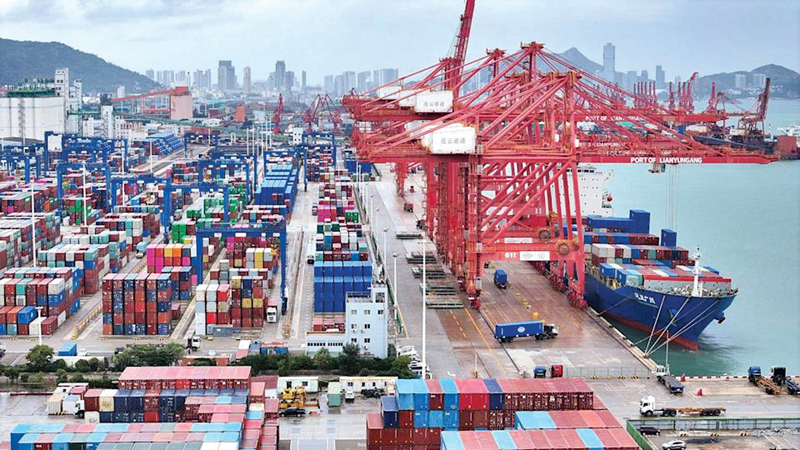Countries have agreed to a global deal to tackle shipping emissions, after nearly ten years of negotiations.
The agreement covers the vast majority of the world’s commercial shipping and means that starting in 2028, ship owners will have to use increasingly cleaner fuels or face fines.
The deal was nearly derailed after Saudi Arabia forced a last minute vote and the US pulled out of talks in London – but it was eventually passed on Friday.
Small island states and environmental groups were angry that a blanket tax was not agreed to and called the deal “unfit for purpose”.
Shipping accounts for around 3% of global emissions. But unlike many other sectors it has struggled to reduce its carbon footprint over the past decade and is reliant on fossil fuels such as diesel.
But the agreement means it is now the first industry in the world with internationally mandated targets to reduce emissions.
The agreement was passed at the UN’s International Maritime Organisation (IMO) meeting.
It will require owners of large international vessels to increase their use of less carbon intensive fuels or face a penalty of up to $380 per tonne of carbon dioxide emissions they emit from burning fuel.
Although the final agreement was passed, it had to be put to a vote – an unusual move for UN bodies that usually agree measures by consensus. The vote was requested by Saudi Arabia, who did not support the agreement, and this position was shared by a dozen other oil-producing nations, including Russia.
Although they opposed the proposal, they will be bound to implement it because they are members of the IMO.
There have been moves to improve the efficiency of ships, but emissions have continued to increase in line with global trade – 90% of which is carried by ships.
The most effective measure would be to switch ships away from fossil fuels to green fuels, but that would be very expensive.
“There is no fuel as cheap as diesel that ships use today because when we take crude oil out of the ground, we take out all the nice bits, that’s the kerosene for aviation, diesel and petrol for cars,” said program director for maritime transport at think tank Transport and Environment, Faig Abbasov,
“Whatever is left at the bottom, that’s what ships burn. So no fuel will be as cheap as this because not much energy goes into its production,” he said.
In comparison, the most environmentally friendly fuels like e-kerosene and ammonia are created from initially splitting water molecules to obtain hydrogen, which is a very energy-intensive and costly process.
Figures vary depending on the fuel type but the World Economic Forum estimates that these green fuels are 3-4 times more expensive to produce. “There’s still a huge cost gap between the fossil fuels and the zero emission fuels and we need to close this gap. So you need carrots and sticks and in shipping the stick is not that big yet to use sustainable fuels,” said Refke Gunnewijk, manager for clean industry & transport at the Port of Rotterdam.
Nearly 90% of the world’s goods are moved via ship and the industry continues to grow in line with trade volumes.
Some island states also abstained and said the deal was a watered down version of what they hoped for. An earlier proposal to apply a blanket carbon tax or levy – which would have been a world first – was dropped.
“Let us be clear about who has abandoned 1.5°C. Saudi Arabia, the US and fossil fuel allies pushed down the numbers to an untenable level and blocked progress at every turn,” said Minister Of Energy And Climate Change for Vanuatu, Ralph Regenvanu.
Their disappointment was shared by environmental groups.
“This week, IMO member states squandered a golden opportunity for the global shipping sector to show the world how it can turn the tide on catastrophic climate heating, putting their own goals out of reach”, said president of the Clean Shipping Coalition, Delaine McCullough.
It is estimated that the agreement could achieve an 8% reduction in emissions for the sector by 2030, according to the maritime consultancy UMAS. This would be short of the IMO’s target agreed two years ago to cut emissions by 20% by the end of the decade. – BBC




